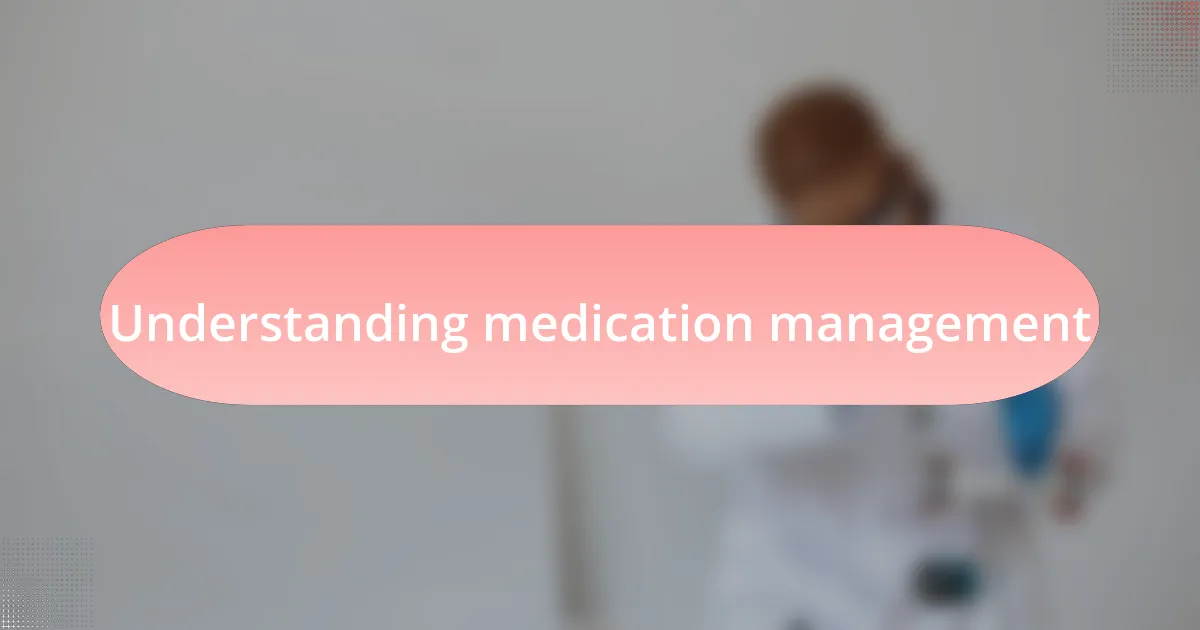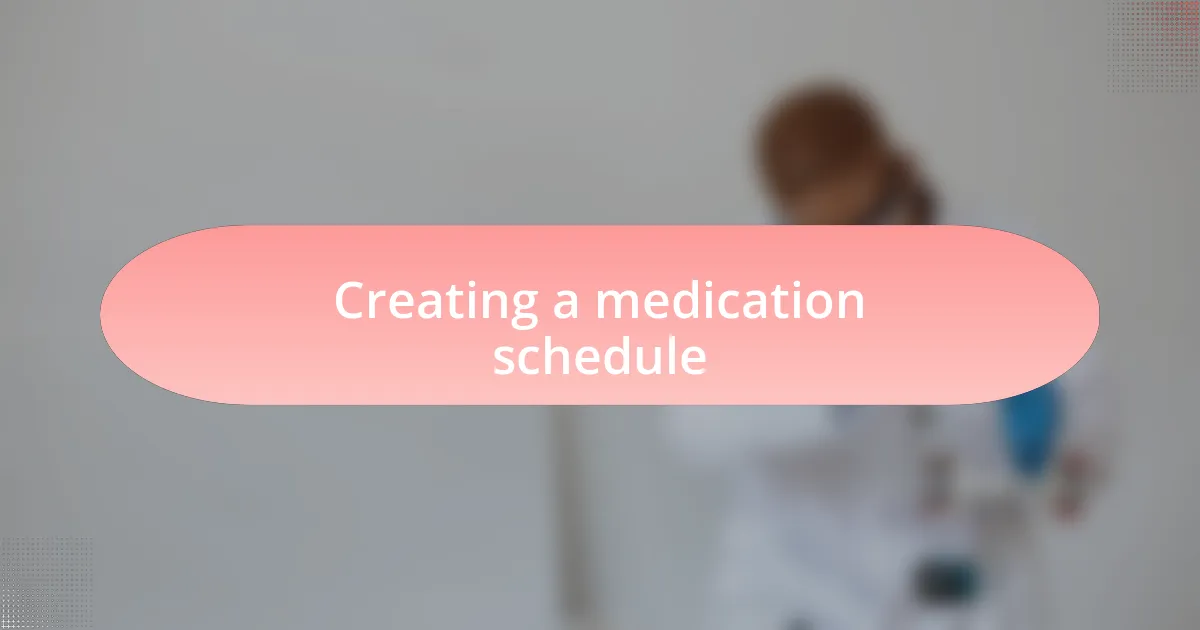Key takeaways:
- Effective medication management involves systematic tracking, utilizing tools like pill organizers and mobile apps to simplify the process.
- Staying informed about medications can reduce anxiety and foster a sense of control over one’s health journey.
- Creating a structured medication schedule, including color-coding and pairing doses with daily activities, enhances adherence and reduces stress.
- Learning from past tracking mistakes emphasizes the importance of adaptability and simplicity in maintaining an effective medication routine.

Understanding medication management
Medication management is not just about taking pills at the right time; it’s a systematic approach to ensure that every aspect of treatment is addressed. I remember feeling overwhelmed during my first experience managing multiple prescriptions. How was I supposed to remember the dosages and timings? It often felt like I needed a personal assistant just to keep track.
In my journey, I discovered that breaking down my medication routine into manageable steps helped immensely. I started using a simple weekly pill organizer that visually guided me through my doses. It may seem basic, but seeing my medications laid out reduced my anxiety significantly. Have you ever tried something similar? Sometimes, visual aids can make a complex task feel so much simpler.
Another crucial element I found in medication management is staying informed. I make it a point to read up on my prescriptions and any potential interactions. Once, I came across a surprising fact about a medication I was taking that prompted me to discuss it with my doctor. Engaging deeply with my treatment plan has empowered me, making me feel more in control of my health journey. Isn’t it fascinating how knowledge can transform anxiety into confidence?
![]()
Importance of tracking medications
Tracking medications is essential to maintain not just the effectiveness of treatment, but also personal wellbeing. I remember a time when I neglected this aspect, leading to missed doses and increasing health complications. It made me realize firsthand how critical consistent tracking is; it’s not just about adherence—it’s about ensuring my body receives what it needs to heal and thrive.
Moreover, keeping a detailed log of medications can prevent dangerous interactions. Once, I encountered a situation where I was prescribed a new medication, unaware of its potential clash with what I was already taking. After discussing my medications with my pharmacist, I learned that simply noting my meds could help avert a serious health scare. Have you ever thought about how an easy tracking system could safeguard your health?
In addition, tracking medications fosters a sense of responsibility and ownership over one’s health journey. I found that when I actively recorded my doses, it not only built my confidence but also enhanced my communication with healthcare providers. This two-way street of information seemed to strengthen my healthcare experience. How does feeling in control of your meds affect how you view your overall health?
![]()
Tools for tracking medications
Tracking medications effectively is all about using the right tools. For me, a simple pill organizer transformed how I managed my routine. I remember the anxiety of rummaging through bottles each day, but once I started using that organizer, it felt like a weight lifted off my shoulders. Have you ever tried something so simple that changed the game?
Mobile apps are also phenomenal for medication management. I’ve found that setting reminders through these apps not only prompted me to take my pills on time but also helped me feel more in control. It’s like having a personal assistant who gently nudges you to prioritize your health. Have you explored any apps that integrate medication tracking into your daily routine?
Don’t overlook a trusty journal or calendar. Writing down when I took my medications not only reinforced my memory but also created a visual record that allowed me to see patterns over time. I often reflect on my journey and wonder how these small efforts to jot things down have provided clarity in my treatment. Have you considered how a handwritten log might benefit your own health?

Creating a medication schedule
Creating a medication schedule has been a game changer for me. I once struggled to keep track of multiple prescriptions, often forgetting which ones to take and when. But when I started plotting everything on a weekly calendar, it gave me both structure and peace of mind. Have you ever thought how much more empowered you’d feel by having everything laid out clearly?
I learned the value of color-coding my medications, which added a burst of visual organization to my routine. Assigning different colors to various medications made the whole process lighter and even enjoyable. It’s fascinating how something so simple can reduce my anxiety around medication adherence. Have you ever tried adding a splash of color to your health management?
Establishing specific times for each dose proved vital as well. I paired my medication schedule with daily activities, like taking my morning meds with breakfast. This routine not only ingrained my meds into my day but also created a comforting rhythm. Honestly, doesn’t it feel rewarding when you check off each dose, knowing you’re taking charge of your health?
![]()
Personal experiences with medication tracking
Tracking my medications has often felt like juggling, but I’ve found my rhythm over time. I vividly remember a period where I relied solely on sticky notes scattered around my kitchen. Initially, it was chaotic—I’d find a note on the fridge, only to realize I’d missed a dose or mixed up the time. Have you ever felt that sinking feeling of uncertainty when you can’t remember if you took your meds?
Eventually, I transitioned to a digital app, which transformed my experience. One particular morning, I hit “remind me” for the first time. When the alert chimed, I felt an overwhelming sense of relief—like a weight had lifted off my shoulders. Isn’t it incredible how technology can simplify something as crucial as our health management?
I’ve also found that sharing my medication tracking journey with friends has made a significant difference. Whether it’s a simple text asking if they’re keeping track or joining a support group, having that connection not only holds me accountable but also adds a layer of emotional support. Have you ever realized how sharing a journey can turn a daunting task into a relatable experience?
![]()
Tips for effective medication tracking
When it comes to effective medication tracking, consistency is key. I learned this the hard way after I forgot to take a medication dose one evening. Now, I set a specific time each day to take my meds and stick to it religiously. Have you ever tried integrating it into your daily routine, like brushing your teeth? It can make a world of difference.
Another tip that worked wonders for me is using visual reminders. I used to keep my medications in a bright, labeled container on the kitchen counter—it was hard to miss. I found that having a tangible, visible cue served as a constant reminder. Have you thought about how something as simple as placement can influence your habits?
Finally, I recommend keeping a journal to log my medications, side effects, and how I felt each day. This practice not only helped me stay accountable but also provided insights into my health journey. By tracking my experiences, I noticed patterns in how my body reacted to different medications. Isn’t it fascinating how our health stories can unfold when we take a moment to reflect?
![]()
Learning from medication tracking mistakes
It’s interesting how my initial approach to medication tracking often ended in frustration. I once relied solely on memory, thinking I could keep everything straight in my head. This led to a missed dose that left me feeling anxious and worried. Have you ever faced that sinking feeling when you realize you’ve forgotten something crucial? It taught me that proper tracking isn’t just about remembering; it’s about setting up systems to prevent errors.
Another mistake I made involved my tracking method. I tried a fancy medication app, hoping it would solve all my issues. Instead, I ended up overwhelmed by notifications and complicated features that I didn’t understand. Sometimes, simplicity is the way to go. What I found effective were straightforward checklists that I could easily cross off each day. Have you ever experienced frustrations with technology that just didn’t work for you?
Reflecting on these past mistakes opened my eyes to the importance of adaptability in my tracking habits. I learned to adjust my system when I noticed certain strategies weren’t working. For instance, if one method felt like a chore, I switched it up and made it more engaging. It became a lesson in patience and self-forgiveness. Does it resonate with you, the idea of learning and improving rather than being hard on ourselves for past missteps?